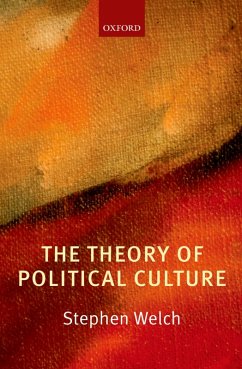Although the idea that politics is influenced by its cultural setting is so plausible as to be almost irresistible, political culture has remained a contested and controversial concept. Just what the cultural setting consists of and how its influence on politics is transmitted remain unclear and disputed. This book argues that the problem is insufficient attention to basic theoretical questions. Positivist political culture research based on attitude surveys, and the interpretivist alternative which explores meaningful context, despite their mutual antipathy share a neglect of these questions, while materialist and discursivist critiques of, and alternatives to, political culture research end up posing the very same questions. Resisting the specialization and sectarianism of much of political and social science, the book tackles head on the questions of what political culture is and how it works. It begins by arguing that we must explore the nature and dynamics of political culture. To do this it is necessary to reach beyond political science and reopen the interdisciplinary exchange in which political culture research was founded. The book reaches into the philosophy of Ludwig Wittgenstein and Michael Polanyi for foundational arguments about the nature of culture, and into social, cognitive, and cultural psychology for findings about human motivation which are radical in their implications for political culture research and its methods. It develops a dualistic theory of political culture, and uses the two dimensions of practice and discourse in a new analysis of the otherwise mysterious causal dynamics of political culture. It provides an explanation of what has hitherto only been asserted: the role played by political culture in both political stability and political change. Thus it restores a rigorously argued concept of political culture to a central place in political science, and suggests an agenda for its future development.
Dieser Download kann aus rechtlichen Gründen nur mit Rechnungsadresse in A, B, BG, CY, CZ, D, DK, EW, E, FIN, F, GR, HR, H, IRL, I, LT, L, LR, M, NL, PL, P, R, S, SLO, SK ausgeliefert werden.









